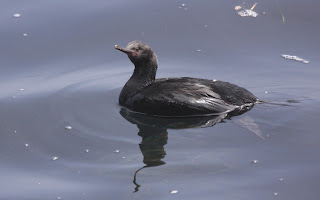Our tour of the bay area started at Point Lobos on the
southern end on June 16. How far north we
have traveled is quickly apparent, with White-throated Swifts swooping overhead
and Pygmy Nuthatches peeping from the trees. As background noise for the incredibly beautiful scenery,
White-crowned and Song Sparrows, Spotted Towhees, Dark-eyed Juncos, Bushtits,
and Western Gulls added their calls to the roar of the surf breaking upon the
cliffs.
Point Lobos - by Renée Haip
Point Lobos - by David Such
Stunted Tree on Point Lobos - by Renée Haip
Before dark, we drove the Pebble Beach 17-Mile Drive. Despite traveling solely along the
road, the bird life along this stretch of coast was excellent. In the evergreen forests leading down
to the ocean, Oregon Juncos, Pygmy Nuthatches, Steller’s Jays, Brown Creepers,
and Spotted Towhees called, along with a flyover Sharp-shinned Hawk. Along the ocean, the usual suspects
were easily perceptible. A single
Black-bellied Plover on the beach added to the excitement. The Bird and Seal
Rocks were incredible to see with their many thousands of nesting Brandt’s
Cormorants and Western Gulls, who share their piece of real estate with Harbor
Seals and California Sea Lions.
Birding Pebble Beach - by David Such
Bird Rock - by Renée Haip
"The Lone Cypress" - by Renée Haip
The next day (June 17), we started out with some early birding at
Fisherman’s Wharf and the Monterey Bay Aquarium site in hopes of some
sea-watching due to the close proximity of the continental shelf along this
stretch of shoreline. With the low
visibility and lack of a scope, we didn’t see much at all, but the many Pigeon
Guillemots and sea lions right under the wharf were great to see. At the aquarium, nesting guillemots and
Pelagic and Brandt’s Cormorants were the subject of our lenses, until the fog
completely enveloped us and made it too dark to get any decent shots.
Pigeon Guillemot - by Joel Such
California Sea Lions - by Joel Such
Adult Western Gull - by Joel Such
Immature Western Gull - by Joel Such
Immature Pelagic Cormorant (I think) - by Marcel Such
Pelagic Cormorant - by Joel Such
Pigeon Guillemot - by Joel Such
Pelagic Cormorants, adult and chick - by Joel Such
Harbor Seal - by Joel Such
An unplanned stop at the Big Basin Redwoods State Park in
Santa Cruz County was perhaps one of the best accidents we had on the
trip. What was originally going to
be a brief afternoon stop quickly turned into a nearly three-hour stay with a
five-mile hike. We tallied 44
species, with our first Hairy Woodpeckers, Olive-sided Flycatchers, Band-tailed
Pigeons, Golden-crowned Kinglets, and Pacific Wrens of the trip. Other abundant species include
Chestnut-backed Chickadee, Swainson’s Thrush, Wrentit, Orange-crowned and
Wilson’s Warblers, Black-headed Grosbeak, and Purple Finch.
Big Basin Redwoods State Park - by David Such
Birding the Coastal Redwoods - by Renée Haip
Wrentit - by Joel Such
Chestnut-backed Chickadee - by Marcel Such
Band-tailed Pigeon - by Joel Such
Band-tailed Pigeon - by Joel Such
Western Scrub-Jay - by Marcel Such
Western Scrub-Jay - by Joel Such
Green Comma - by Joel Such
Northern Checkerspot - by Marcel Such
Foxglove - by Marcel Such
Completing our drive to San Francisco (we were spending the
night just north of town), we drove through Golden Gate Park and hiked the 456
stairs up to Telegraph Hill and the Coit Tower. We didn’t see any birds beyond the normal coastal and urban
species in the extreme fog (we couldn’t even see the top of the Golden Gate
Bridge when we drove through it!), but we did find a raccoon rummaging under
the steps leading up Telegraph Hill.
The famous feral parrot flock was nowhere to be seen, but I think we may
have been there just a little too early in the evening.
Golden Gate Park - by Renée Haip
Climbing the Stairs to Telegraph Hill - by Renée Haip
Coit Tower - by Renée Haip
Golden Gate Bridge in the Fog - by Renée Haip
--
Part 6 is forthcoming!

.jpg)
.jpg)
.jpg)
.jpg)
.jpg)









.jpg)
.jpg)









.jpg)
.jpg)
.jpg)
.jpg)
No comments:
Post a Comment